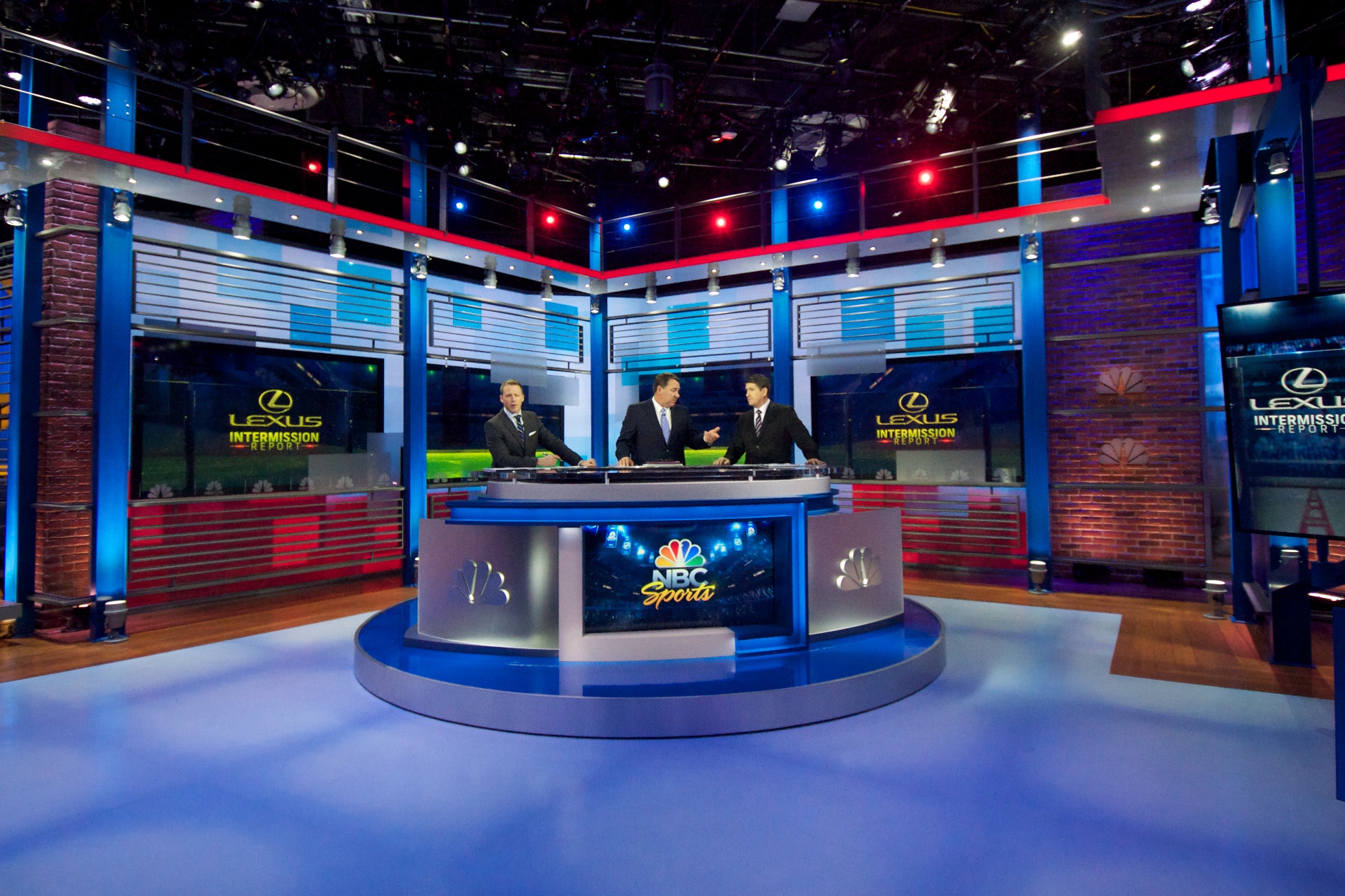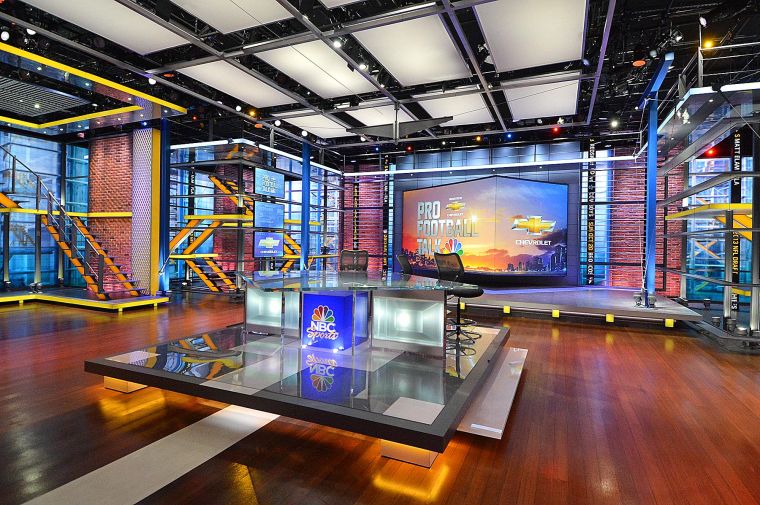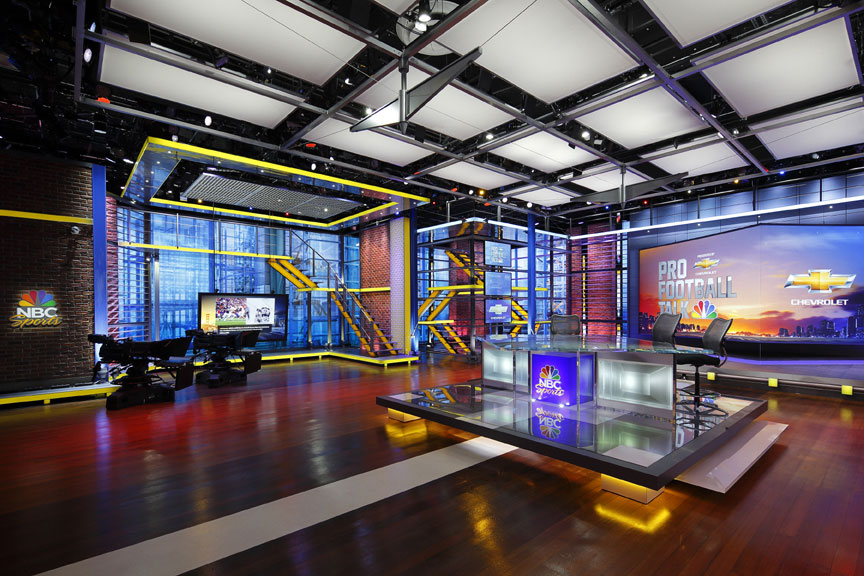NBC Sports Network
HD Studio Lighting Design
From the outset, the primary focus of NBC Sports Network’s new, $100 million dollar state–of–the–art production and operations center in Stamford CT was all about light—both natural light and the high–definition studio lighting design of the FLDA team, led by Bruce Ferri.
Of equal importance was an emphasis on energy efficiency. By relying heavily on an 80% mix of LED fixtures with 20% tungsten, Bruce and the team managed to reduce usage to about 7 watts per square foot from the originally estimated 18 watts per square foot (an approximate 98% energy efficiency). The result: a cost reduction from $64 to $8 per kilowatt hour, exactly one–eighth of the original estimate.



NBC Sports' New Energy-Efficient Headquarters Facility
Written by Justin Lang
Projection Lights and Staging News, Saturday, 06 April 2013 12:49
This year, NBC Sports launched their new headquarters in Stamford, CT — a new home for everything sports-related for the media giant which, after a merger with Comcast in Jan. 2011, led to the re-branding of Versus, Golf Channel and other Comcast-launched entities as part of the newly-created NBC Sports Network in Jan. 2012. Most NBC Sports operations are now Stamford-based, including Bob Costas’ Costas Tonight; an exception is Football Night in America, which remains at Rockefeller Center in NYC.
NBC has been expanding the breadth of its global sports coverage, particularly in golf, hockey and both English and Spanish language soccer broadcasts. The network has also recently bolstered its Grand Prix auto race coverage to complement its other standout sports programming, including the Olympics, several NFL Super Bowls and Sunday Night Football broadcasts.
The Stamford facility includes a newsroom and studios for TV broadcasts along with satellite rooms for streaming online video production. Working with detailed specs from NBC Sports, Ferri Lighting Design & Associates (FLDA) lit the three main studios with an emphasis on energy efficiency and dramatic on-camera effects. Barbizon Lighting’s New York office also provided a key assist providing gear, crew and infrastructure for the lighting and control systems throughout the facility.
Jack Morton, the scenic designer, worked closely with FLDA’s Bruce Ferri to achieve a clean look, with fixtures handling keylighting, backlighting and fill duties hanging in concealed positions above canvas ceiling panels. To ensure that ceiling tiles wouldn’t cast visible shadows on the canvas panels, the meticulous design includes the careful use of beam-benders.
Energy Efficiency
From the start, the building was designed for energy efficiency. “The engineers sized the HVAC to accommodate 18 watts per square foot,” notes Ferri, the project’s LD. “The goal was to make the entire building 80/20 — 80 percent LED and 20 percent tungsten. After looking at the options and comparing fixtures, I thought we could do better. In the end, we were able to get the studios to about 98 percent in energy-efficient lighting. That meant that the studios were using about 7 watts per square foot, significantly under the original engineers’ estimate.” Except for “three or four 370W Source Four Lekos” used for lighting props or other studio elements, “almost every fixture in all three studios that we did is LED,” says Ferri, who relied heavily on ETC’s Source Four LED Ellipsoidal fixtures. “There was also a large amount of Chroma-Q, Color Kinetics, Elation and Chauvet fixtures used,” adds John Gebbie, business development manager for Barbizon. Because tungsten-based fixtures are outnumbered by LED alternatives, the building does not have to rely on conventional dimming systems, either. In fact, there is not a single installed dimming rack in the entire facility. “When we needed a dimmer, we used portable dimmers placed at the fixture,” notes Ferri.
Control
The entire lighting system is controlled via ETC’s Ion system. “Any control room can control any studio — lighting wise, video wise and everything else. So, you can be sitting in any area and access any other studio. If you’re on headset, and someone needs you to bring on some lights, and you’re not in that particular room, you don’t have to get up from your workstation, you just log onto the other room, bring up the lights and move on,” says Gebbie. “NBC is working closely with ETC to test the latest version of software, which completely utilizes graphical user interface as a primary interface for the client,” Gebbie says. It bypasses the need for a traditional command line structure for a console to bring up queues and scenes and sub masters, he adds. “They are not using subs, they are not using groups. Instead, they are using a touch screen that’s accessing a graphical user interface, which brings up exactly what scenes you want — you see the talent positions on the plan, and you can tweak the keys, tweak the backs, tweak the fills and bring up the preset looks” so that two-person interviews in the morning, mid-day and evening broadcast segments match. “It’s completely user intuitive,” Gebbie says.
Challenges
If the new LED fixtures have significant advantages in terms of energy usage, changing lighting fixtures in response to changing camera positions on the set can be more involved. “Every time you move a light, instead of just moving the light and plugging it into the closest available dimmer, you need to break out of, and re-establish, the data chain — and find a new place for that light to break into a data chain,” Ferri says, noting fixture requirements for both data and power. “So you are moving two cables for every light. You have to be little bit more organized and think about it a lot more to keep everything working properly.”
At the Stamford facility, Ferri adds, the crew quickly learned that with camera angles moving “radically,” the traditional approach of hanging, testing and focusing the lights prior to camerablocking had to be revised. “It became a real time-consuming process to move all the lights that needed to be moved.”
For the next two studios, the lighting crew tried a different approach. “We changed our tactics and hung and focused all of the set lights,” since major changes in the set were far less likely than changes in camera angles. “We did camera blocking under work lights and established what the camera angles were and what the shots were, and then kind of lit [by] shot, accordingly, so that the key and back lights didn’t have to move so radically.”
Gear
Newsroom (Studio One) Dot Com Studio
10 ETC Source Four LED fixtures 26 ETC Source Four LED (Various Degrees)
20 PAR38 LED fixtures 7 ETC Source Four 375W fixtures
7 Color Kinetics ColorBurst Compact 24 TMB PAR38 LED fixtures
8 Elation EPAR QA fixtures 10 Color Kinetics iW Burst Compacts
10 Color Kinetics ColorBurst Powercore
Studio Two 10 Chauvet Colorado 1 Quad Tour
106 ETC Source Four LED fixtures
14 ETC Source Four 575W fixtures Golf Channel Studio
123 TMB PAR38 LED fixtures 5 ETC Source Four LED fixtures
42 Altman Spectra IQ38 LED fixtures 10 ETC Source Four 375W fixtures
38 Altman IQ20 fixtures 10 Chroma-Q Studio Force V12s
65 Elation EPAR QA fixtures 6 Elation EPAR QA fixtures
23 Chroma-Q Color Force 12s 6 Altman IQ20 Birdie LEDs
4 Chroma-Q Color Span 48s 4 TMB PAR38 LED fixtures
2 Chroma-Q Color Block2 fixtures
Studio Three
172 ETC Source Four LED fixtures
2 ETC Source Four LED Lustr+ fixtures
29 Altman IQ20 Birdie LEDs
151 TMB PAR38 LED fixtures
53 Altman Spectra IQ38 LED fixtures
109 Elation EPAR QA fixtures
3 Chauvet COLORado 1 Quad Tour
23 Chroma-Q Color Force 12s
21 Chroma-Q Color Block2 fixtures

